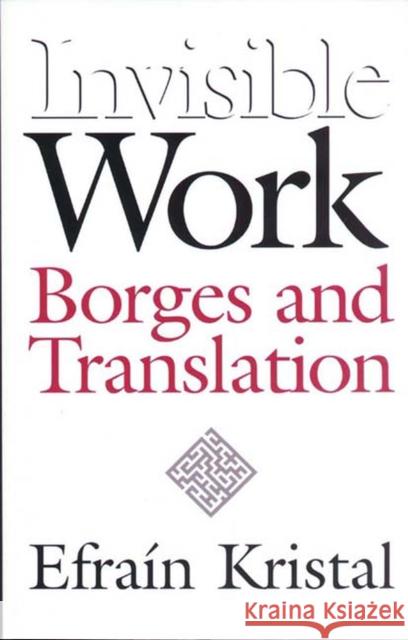Invisible Work: Russian and Soviet Studies of the History of American Thought » książka
Invisible Work: Russian and Soviet Studies of the History of American Thought
ISBN-13: 9780826514073 / Angielski / Twarda / 2002 / 216 str.
Invisible Work: Russian and Soviet Studies of the History of American Thought
ISBN-13: 9780826514073 / Angielski / Twarda / 2002 / 216 str.
(netto: 415,66 VAT: 5%)
Najniższa cena z 30 dni: 371,67 zł
ok. 16-18 dni roboczych
Bez gwarancji dostawy przed świętami
Darmowa dostawa!
It is well known that Jorge Luis Borges was a translator, but this has been considered a curious minor aspect of his literary achievement. Few have been aware of the number of texts he translated, the importance he attached to this activity, or the extent to which the translated works inform his own stories and poems.Between the age of ten, when he translated Oscar Wilde, and the end of his life, when he prepared a Spanish version of the Prose Edda, Borges transformed the work of Poe, Kafka, Hesse, Kipling, Melville, Gide, Faulkner, Whitman, Woolf, Chesterton, and many others. In a multitude of essays, lectures, and interviews Borges analyzed the versions of others and developed an engaging view about translation. He held that a translation can improve an original, that contradictory renderings of the same work can be equally valid, and that an original can be unfaithful to a translation.Borges's bold habits as translator and his views on translation had a decisive impact on his creative process. Translation is also a recurrent motif in Borges's stories. In -The Immortal, - for example, a character who has lived for many centuries regains knowledge of poems he had authored, and almost forgotten, by way of modern translations. Many of Borges's fictions include actual or imagined translations, and some of his most important characters are translators. In -Pierre Menard, author of the Quixote, - Borges's character is a respected Symbolist poet, but also a translator, and the narrator insists that Menard's masterpiece-his -invisible work--adds unsuspected layers of meaning to Cervantes's Don Quixote. George Steiner cites this short story as -the most acute, most concentrated commentary anyone has offered on the business of translation.-In an age where many discussions of translation revolve around the dichotomy faithful/unfaithful, this book will surprise and delight even Borges's closest readers and critics.











